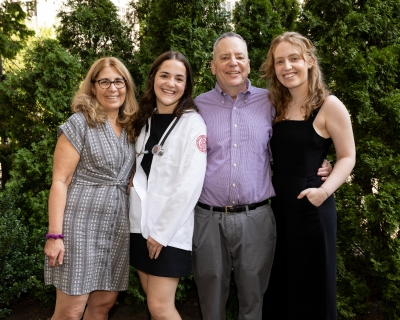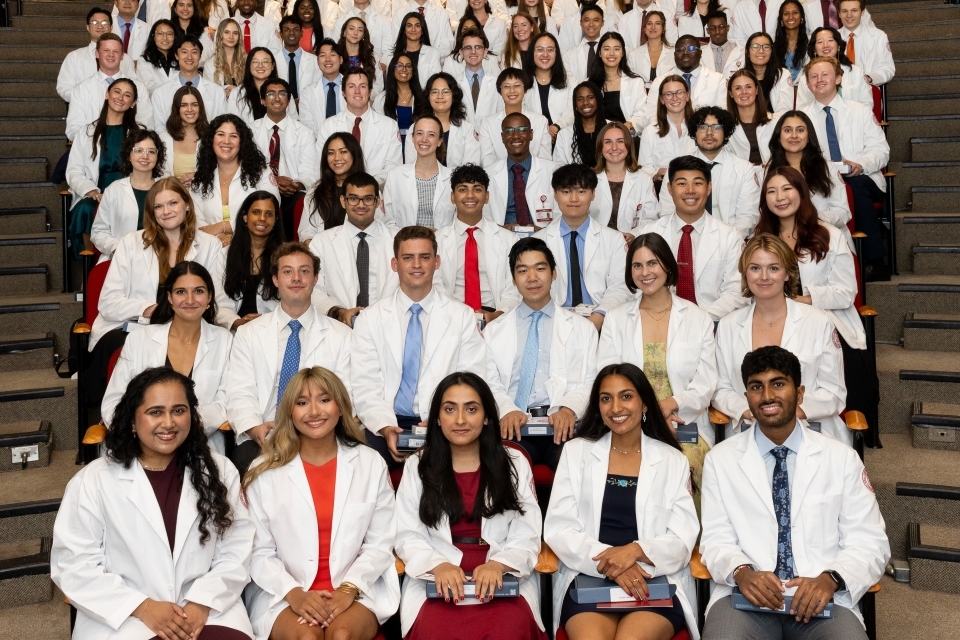
Jennifer Weiss’s path to medicine began as a young child, when an ambulance responded to her New Jersey home to care for her dad, who has heart disease. During the scary episode, one of Weiss’s earliest memories, the emergency medical technicians and paramedics offered empathy and compassion and put everyone at ease.
Inspired to help others, Weiss trained as an EMT at age 16 and joined her local first aid squad. But she quickly realized that she wanted more.
“I wanted to have a greater impact on my patients than just the short ride to the hospital,” she said, “where my knowledge and skills stopped and the receiving physician’s skills took over.”
Weiss nurtured her scientific curiosity studying human biology, health and society at Cornell’s College of Human Ecology in Ithaca, where she also worked as an EMT for Bangs Ambulance and volunteered as a firefighter and EMT for Cayuga Heights Fire Department. In responding to emergency calls, Weiss noticed certain ingrained health inequities that limited some patients’ access to primary care. So, during her senior year at Cornell she created the EMS Equity Project, which offered monthly clinics in downtown Ithaca, focused on resource navigation and teaching patients how to navigate the health care system. These undergraduate experiences reinforced her decision to pursue a career in medicine, and to do so at Weill Cornell Medicine, with its particular strength in caring for a diverse population.
Surrounded by friends and family, Weiss and 105 of her fellow students in the Class of 2029 participated in Weill Cornell Medical College’s annual White Coat Ceremony on Aug. 12, officially marking the beginning of their medical education. Dr. Geraldine McGinty, the E. Darracott Vaughan, Jr., M.D. Senior Associate Dean for Clinical Affairs and senior associate dean of faculty, read the Hippocratic Oath, articulating the principles underpinning the professional and ethical foundations of medicine. With the help of faculty, students donned their new coats and received stethoscopes, both provided by the Moss Family Foundation and the Paul F. Miskovitz, M.D. ’75 Stethoscope Fund for Medical Students.
“The white coat is a symbol that I’m going to be the person who walks into the room and eases anxiety for individuals, providing empathy and compassion,” said Weiss, who will be the first in her family to be a medical doctor. “Having been exposed to many white coats, it’s surreal that I’m going to eventually be a physician who provides comfort and care for other families.”
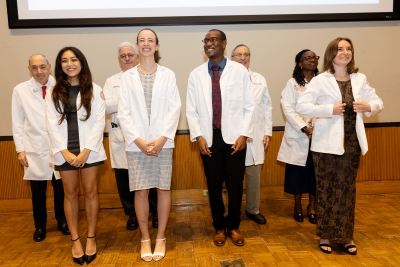
Medical students don their white coats with a little help from faculty. Credit: David Teng/Studio Brooke
A milestone in their medical journeys, the ceremony also represents the students’ entrance into a new ecosystem—not unlike a fishtank—that requires nurturing and balance, said Dr. Joseph Safdieh, senior associate dean for education. He urged students to embrace that ecosystem and to cultivate their own professional identities within it.
“You are not here to become a version of someone else,” said Dr. Safdieh, who is also the Richard P. Cohen, M.D. Professor of Medical Education and a professor of neurology. “You are here to become the best version of yourself — as a physician. And part of my job — and the job of every educator and mentor you’ll encounter — is to help you do that with honesty, curiosity and support.”
Physicians can also effect change, using the power imbued in the white coat to do something that benefits the public good, said keynote speaker Dr. Sallie Permar, chair of the Department of Pediatrics and the Nancy C. Paduano Professor in Pediatrics. She noted how as an undergraduate volunteer at a mission hospital in Zambia during the AIDS epidemic she was overwhelmed by the devastation to the health of the adult population, and became outraged when she saw babies dying of HIV. Yet, when measles capitalized on the weakened immunity of children in the same village, there was a solution: a vaccine. That passion to end devastating epidemics turned into a call to action and led her to become a vaccine scientist.
“The white coat you’re about to wear is your canvas,” she said. “Let it reflect your story and how you turned passion into action, and action into good that will benefit humanity. Wear it well, protect your well-being, and never forget the power you hold to shape lives far beyond the clinic.”
The students in the Class of 2029 reflect a breadth of backgrounds, interests, accomplishments, experiences and talents that will enable them to contribute to the communities Weill Cornell Medical College serves. They attended 51 different undergraduate institutions across 23 states, and 11 are Cornell alumni. Eighteen percent are first-generation college graduates. The group also has strong global connections. Students were born in 11 countries, and 37 percent are bilingual or multilingual. They have lived, studied and worked in 30 countries.
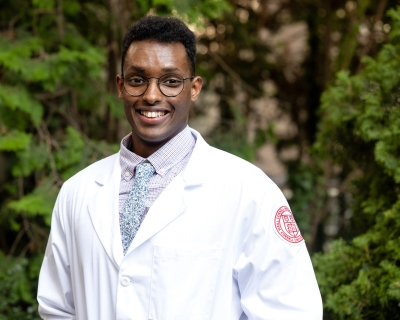
Abucar Mohamed. Credit: David Teng/Studio Brooke
“You are truly a remarkable class,” said Dr. Janine Katzen, associate dean for admissions and an associate professor of clinical radiology. “We are eager to see the energy and vibrancy you will bring to Weill Cornell Medical College. We warmly welcome each of you and look forward to your continuing the legacy of engagement, discovery, intellectual curiosity, collaboration, and service that defines our community.”
From Lebanon to Idaho to Washington D.C., Abucar Mohamed traveled a long road to accepting his White Coat at Weill Cornell Medical College. After graduating from The College of Idaho in 2023, Mohamed decided to pursue a two-year research fellowship with the National Institutes of Health to figure out his next career step. “I was part of a team investigating a rare neurodevelopmental illness, and this is where I learned what an M.D.-Ph.D. truly was the first time,” he said. “I suddenly realized that I could unite the practices of research and medicine—the two paths I was considering—with the goal of improving patient care.”
Now a first-year student in the Tri-Institutional M.D.-Ph.D. Program, Mohamed was attracted to Weill Cornell’s top-tier research opportunities and access to collaborations between the renowned institutions of Weill Cornell Graduate School of Medical Sciences, The Rockefeller University and Memorial Sloan Kettering Cancer Center. “I think the M.D.-Ph.D. program provides a unique training that fosters deep study and new insights about scientific problems, especially in basic science,” he said. “Physician scientists are critical in bridging the gap between complex biology in the lab and how those findings can be applied to help patients.”
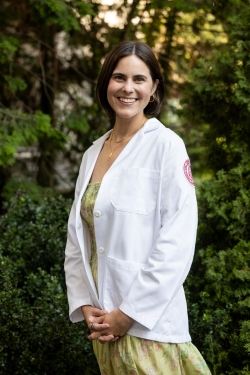
Delaney Bostwick. Credit: David Teng/Studio Brooke
Delaney Bostwick took an unconventional path to Weill Cornell Medical College, pursuing medicine as a second career. Passionate about math and science, Bostwick started college at the University of South Carolina with a pre-med focus, but started to question that direction during her coursework. Unsure whether medicine was truly the right fit, she switched her major to mathematics and after graduation joined Teach for America. She was placed at the Urban Assembly School for Applied Math and Science in the Bronx, where she taught math to middle and high school students for eight years while earning a Master of Arts in Teaching and later an advanced certificate in special education. While teaching, she began to realize that her students’ health and well-being outside of school was impacting what was happening inside school.
“I just got way more interested in the biological and neurological underpinnings of learning,” she said, “and I realized that I was still interested in becoming a physician.” She enrolled in a post-baccalaureate degree from Columbia and is now starting medical school at age 32.
“For me, starting medical school is a dream realized, something that I never thought possible,” she said. “Earning that white coat is the embodiment of a personal journey, returning to myself and having confidence that this is something that I can do.”


